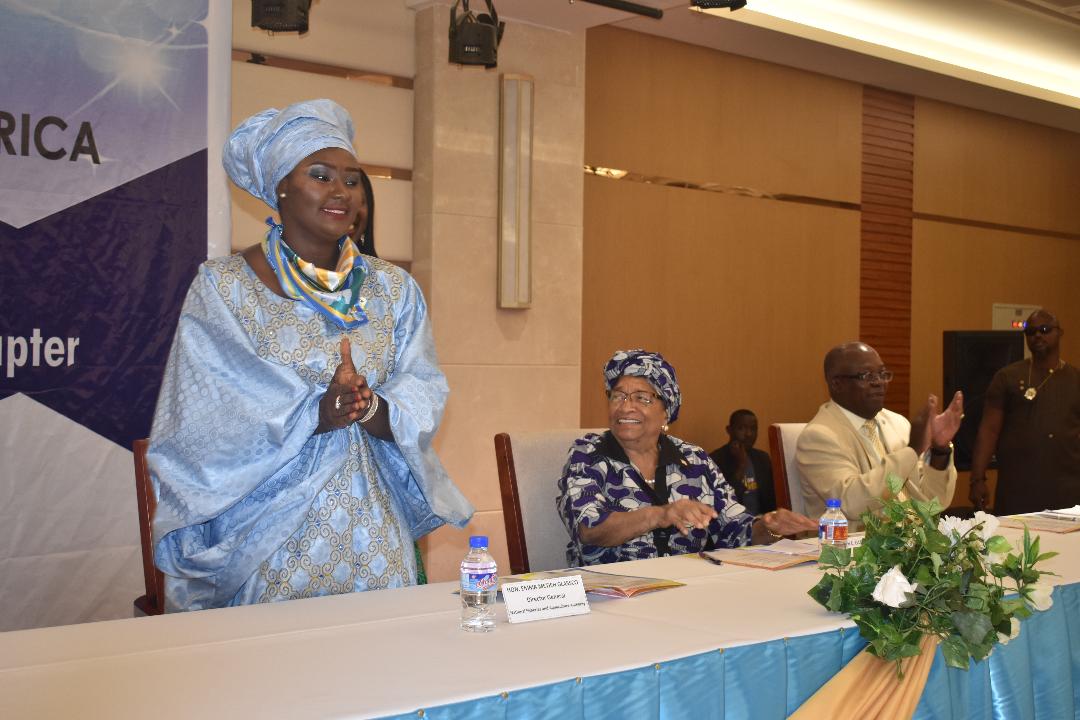PHOTO: NaFAA boss Emma Glassco addressing a panel
Press Release
The National Fisheries and Aquaculture Authority (NaFAA) says it registers with utmost dismay, the Environmental Justice Foundation (EJF) report captioned “LIBERIAN FISHING COMMUNITIES THREATENED BY CHINESE SUPERTRAWLERS”, dated July 14, 2020, published on the EJF’s website (https://ejfoundation.org/news-media/liberian-fishing-communities-threatened-by-chinese-supertrawlers).
NaFAA says the information and data provided in the report are fabricated, misleading, baseless, biased and a complete fallacy. Categorically, the Fisheries Authority classifies the report as “Sensational Journalism” which possess threat to socioeconomic and political stability.
According to a NaFAA release, the report has the propensity to create alarm on food security and environmental degradation.
NaFAA considers the report as an instrument of political insecurity designed to incite the fisher folks against the fisheries administration in particular and Liberian populace as well as the State in general.
“Considering that fisheries is science-based, decisions on management measures are driven by evidence resulting from scientific research, timely and accurate data as well as reliable information. It is therefore prudent to provide accurate data and information to the public rather than unreliable information”, the release notes.
Acknowledging that “Liberia has taken enormous steps forward in managing its fisheries, and the National Fisheries and Aquaculture Authority (NaFAA) has played a positive role combatting illegal and unsustainable fishing and further acknowledging that fisheries management involves hard choices” as indicated in your report, we want to emphatically provide clarity on the status of the vessels for public consumption and not due to public sentiment that may emanate from your unprofessional publication, for which we owe you no explanation”.
The National Fisheries and Aquaculture Authority notes that the Artisanal fishery sub sector in Liberia is an open fishery. Information and data collection is somehow difficult considering the complexity of the fisheries.
According to NaFAA, Liberia in addition to Togo, Senegal, Ghana and Nigeria, has successful experience in consolidating participatory data collection initiatives in the country.
“A case study report to be submitted to CECAF Secretariat for sharing with group is ongoing. The artisanal fishery has benefited from fisheries good governance instituted by NaFAA judging from the increase in catch quantity and quality since the new fisheries regime was established in 2010”.
“Statistics revealed that Liberia recorded 5,500 tons landings for its small pelagic species alone in 2017, with indication that the average catch for the last five years is 60,000 for Sardinella species alone in four selected neighboring countries including Liberia, Sierra Leone, Guinea Conakry and Guinea Bissau. However, management’s recommendation revealed that as a precautionary measure and due to uncertainty in the data, catch should not exceed current fishing level for 2017. Currently, Liberia has no industrial fishing vessel harvesting pelagic species”.
Recent (2019) demersal survey report conducted by R/V Dr. Fridjof Nansen shows that Liberia has the highest biomass of 55,715 tons more than Sierra Leone, Guinea Conakry and Guinea Bissau. Therefore, the MSY for demersal species cannot be 6,000 tons as mentioned by EJF.
The shrimp fishery in Liberia, based mainly on P. notialis, P. atlantica, P. longirostris, P. kerathurus and P. monodon was one of the first successfully established in West Africa, supporting an export industry for many years until outbreak of the civil war in the 1990s. An economic analysis of the fishery undertaken by the International Finance Corporation in 2015 suggests optimal catch rates per vessel is 70 tons of shrimp per season, for vessels of 350 hp. Fishing effort in recent years has been low to non-existent, and the fishery is expected to provide high catch rates, particularly at the re-starting of the fishery[1].
At the moment there is no shrimper vessels licensed to fish in the Liberian waters. Liberia has a scientific fisheries observer program with trained and experienced personnel that will be deployed on all commercial shrimp vessels when registered as it is in the case of demersal trawlers.
Liberia is considered a role model and a vanguard force in the fight to prevent, deter and eliminate illegal fishing activities with its monitoring, control and surveillance system being one of the best in the sub-region. A status we have maintained and continue to maintain since 2010. The core function of NaFAA is to sustainably manage its fisheries resources which provides food security, employment opportunity, income generation and foreign exchange for the Liberian people. This is evidenced by the licensing of six demersal trawlers with average length of 35m, 270 GRT and 120 horsepower, landing 800 tons per annum; fishing sustainably over the past six years.
Cognizant of the importance of fish protein to the nation, NaFAA is exerting efforts to industrialize the fisheries sector as evidenced by the statement in your report mentioned above. The institution shall in no way compromise the food security and well-being of its people. NaFAA will continue to protect the interest of the fishermen and the population who depend on fish resources for food security and source of livelihood. Decision relating to the status of licensing the vessels by NaFAA is still under microscopic view bearing in mind sustainable management of Liberia fisheries resources. Therefore, it is with great dismay that the EJF will incite the Liberia Fishermen Association (LAFA) and Collaborative Management Association (CMA) against NaFAA when no decision has been reached to license these six trawlers.
Moreover, Liberia has ratified various international binding and voluntary instruments that are of relevance to fisheries. As such, the Government of Liberia will continue to uphold the conventions to which she is a signatory.
In conclusion therefore, NaFAA urges the EJF and other non-governmental organizations (NGOs) both national and international to operate within the scope of its thematic areas professionally and distance itself from any activity that may jeopardize the interest of the State and its people.

